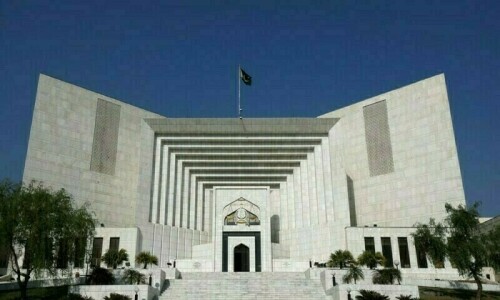ISLAMABAD: Justice Qazi Faez Isa of the Supreme Court has said the Constitution of Pakistan is based on Islamic rulings and any attempt to tamper with this sacred document will be tantamount to tampering with the injunctions of Islam.
Addressing an event of the Islamabad High Court Bar Association (IHCBA) here on Friday, Justice Isa said Qaid-i-Azam Mohammad Ali Jinnah had said that Pakistan’s constitution would be democratic and based on Islamic principles.
“There is a close correlation between the Holy Quran, Sunnah and fundamental rights enshrined in the Constitution,” he said, adding that the Constitution as per the Islamic injunctions also guaranteed the rights of minorities.
The colour of Muslim League’s flag was green but that of Pakistan also contained white which represented the minorities, he said.
SC judge says about two dozen articles of constitution relate to fundamental rights
Explaining the fragile state of affairs of the successive governments and fall of Dhaka, Justice Isa said: “We lost East Pakistan because the defenders violated their constitutional oath and did not obey the Constitution.”
The senior SC judge said it was ironic that most of the people did not know much about the Constitution, adding that this was because neither there was official Urdu translation of this sacred book nor was its interpretation available in the national language.
He said the Constitution comprised 280 articles and about two dozen articles related to the fundamental rights. He read out these 24 constitutional provisions and also correlated them with the verses of the Holy Quran.
Justice Isa pointed out that Article 3 of the Constitution is against exploitation as mentioned in Ayet 279 of Surah Al-Baqarah; Article 4 is about equal treatment for all and it is in accordance with Ayet 64 of Surah Maryam and Ayet 32 of Surah Al-A’raf.
Likewise, he said, Article 9, which guarantees life, is enshrined in Ayet 32 of Aurah Al-Maidah, adding that a number of verses of the Holy Quran are about the right to fair trial as preserved in Article 10 of the Constitution.
The SC judge further said Article 11 was against forced labour or slavery, Article 12 against retrospective enforcement of law, Article 13 against double jeopardy, Article 14 about dignity of mankind, Article 15 for freedom of movement, Articles 16 and 17 for right to assembly and affiliation with political parties, respectively, Article 18 for freedom of profession, Article 19 for freedom of expression, Articles 20, 21 and 22 for right to exercise religious faith, preaching and tax payment, Article 23 for acquiring or disposing of properties, Article 24 for protection of movable and immovable properties, Article 25 against discrimination and Articles 26, 27 and 28 for empowering the vulnerable segments of society. All these articles were derived from the Holy Quran and Sunnah, he added.
Justice Isa said Article 227 of the Constitution ensured that any provision against the Islamic ruling may be set aside.
He said the Supreme Court and high courts were constitutionally bound to protect the fundamental rights enshrined in the Constitution.
Earlier, IHCBA president Zahid Mehmood Raja said he had invited Justice Isa to enlighten lawyers, especially young advocates, about fundamental rights. He said the bar association had taken this initiative to educate young lawyers and judges of superior courts, senior lawyers, politicians and distinguished personalities would be invited on regular intervals.
Published in Dawn, April 10th, 2021













































Dear visitor, the comments section is undergoing an overhaul and will return soon.